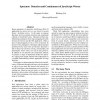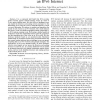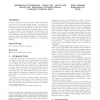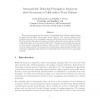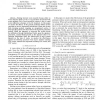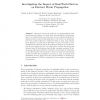114
click to vote
USENIX
2008
15 years 4 months ago
2008
Recent popularity of interactive AJAX-based Web 2.0 applications has given rise to a new breed of security threats: JavaScript worms. In this paper we propose Spectator, the first...
113
Voted
CCS
2003
ACM
15 years 7 months ago
2003
ACM
After the Code Red incident in 2001 and the SQL Slammer in January 2003, it is clear that a simple self-propagating worm can quickly spread across the Internet, infects most vulne...
105
Voted
RAID
2005
Springer
15 years 8 months ago
2005
Springer
Abstract. Network worms are malicious programs that spread automatically across networks by exploiting vulnerabilities that affect a large number of hosts. Because of the speed at...
RAID
2005
Springer
15 years 8 months ago
2005
Springer
To detect and defend against Internet worms, researchers have long hoped to have a safe convenient environment to unleash and run real-world worms for close observation of their in...
106
click to vote
PADS
2005
ACM
15 years 8 months ago
2005
ACM
We introduce a novel worm containment strategy that integrates two complementary worm quarantine techniques. The two techniques are linked, with one strategy employing the other a...
110
click to vote
INFOCOM
2005
IEEE
15 years 8 months ago
2005
IEEE
— It is a commonly held belief that IPv6 provides greater security against random-scanning worms by virtue of a very sparse address space. We show that an intelligent worm can ex...
111
click to vote
IPCCC
2006
IEEE
15 years 8 months ago
2006
IEEE
Computer worms are a serious problem. Much research has been done to detect and contain worms. One major deficiency in most research is that the claims are supported by theoretic...
105
click to vote
IPCCC
2006
IEEE
15 years 8 months ago
2006
IEEE
We present an approach to the question of evaluating worm defenses against future, yet unseen and possibly defense-aware worm behavior. Our scheme employs model checking to produc...
94
Voted
GLOBECOM
2006
IEEE
15 years 8 months ago
2006
IEEE
— Existing Internet worm research focuses either on worm detection inside an AS, or on prevention of Internet-wide worm epidemic. But of more practical concern is how to repel wo...
112
click to vote
ICISS
2007
Springer
15 years 8 months ago
2007
Springer
This paper reports the results of our experimentation with modeling worm behavior on a large scale, fully adaptable network simulator. Our experiments focused on areas of worm scan...
